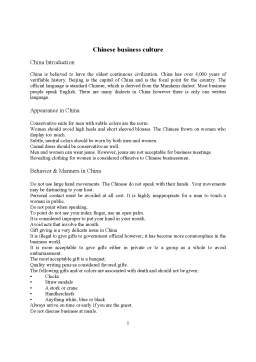Extras din proiect
Introduction
China is believed to have the oldest continuous civilization. China has over 4,000 years of verifiable history. Beijing is the capital of China and is the focal point for the country. The official language is standard Chinese, which is derived from the Mandarin dialect. Most business people speak English. There are many dialects in China however there is only one written language.
Appearance in China
Conservative suits for men with subtle colors are the norm.
Women should avoid high heels and short sleeved blouses. The Chinese frown on women who display too much.
Subtle, neutral colors should be worn by both men and women.
Casual dress should be conservative as well.
Men and women can wear jeans. However, jeans are not acceptable for business meetings.
Revealing clothing for women is considered offensive to Chinese businessmen.
Behavior & Manners in China
Do not use large hand movements. The Chinese do not speak with their hands. Your movements may be distracting to your host.
Personal contact must be avoided at all cost. It is highly inappropriate for a man to touch a woman in public.
Do not point when speaking.
To point do not use your index finger, use an open palm.
It is considered improper to put your hand in your mouth.
Avoid acts that involve the mouth.
Gift giving is a very delicate issue in China
It is illegal to give gifts to government official however; it has become more commonplace in the business world.
It is more acceptable to give gifts either in private or to a group as a whole to avoid embarrassment.
The most acceptable gift is a banquet.
Quality writing pens as considered favored gifts.
The following gifts and/or colors are associated with death and should not be given:
• Clocks
• Straw sandals
• A stork or crane
• Handkerchiefs
• Anything white, blue or black
Always arrive on time or early if you are the guest.
Do not discuss business at meals.
Do not start to eat or drink prior to the host.
As a cultural courtesy, you should taste all the dishes you are offered.
Sample meals only, there may be several courses.
Never place your chopsticks straight up in your bowl. By placing your sticks upright in your bowl your will remind your host of joss sticks which connotes death.
Do not drop the chopsticks it is considered bad luck.
Do not eat all of your meal. If you eat all of your meal, the Chinese will assume you did not receive enough food and are still hungry.
Women do not usually drink at meals.
Tipping is considered insulting, however the practice is becoming more common.
Communications in China
Bowing or nodding is the common greeting; however, you may be offered a handshake. Wait for the Chinese to offer their hand first.
Applause is common when greeting a crowd; the same is expected in return.
Introductions are formal. Use formal titles.
Often times Chinese will use a nickname to assist Westerners.
Being on time is vital in China.
Appointments are a must for business.
Contacts should be made prior to your trip.
Bring several copies of all written documents for your meetings.
The decision making process is slow. You should not expect to conclude your business swiftly.
Many Chinese will want to consult with the stars or wait for a lucky day before they make a decision.
The most important member of your company or group should lead important meetings. Chinese value rank and status.
Develop a working knowledge of Chinese culture.
Allow the Chinese to leave a meeting first.
Greetings
Address a person using his or her family name only, such as Mr. Chen or Ms. Hsu. The Chinese family name comes first and is usually one syllable. A one or a two-syllable given name follows a family name. For example, in the case of Teng Peinian, Teng is the family name and Peinian is the given name. In some instances, Westernized Chinese might reverse their names when visiting and sending correspondence abroad. Therefore, it is always a good idea to ask a native speaker which name is the family name.
For business purposes, it is traditionally acceptable to call a Chinese person by the surname, together with a title, such as "Director Wang" or "Chairman Li." Avoid using someone's given name unless you have known him or her for a long period of time. Formality is a sign of respect, and it is advisable to clarify how you will address someone very early in a relationship, generally during your first meeting.
Preview document
Conținut arhivă zip
- Chinese Business Culture
- Chinese Business Culture.doc
- Chinese Business Culture.ppt



















